Bearded dragons are popular pets known for their unique appearance and docile nature. However, like any living creature, they are susceptible to health issues that can impact their overall well-being. Understanding bearded dragon health is crucial for pet owners to ensure that their reptile companions live long and healthy lives.
Key Takeaways
- Understanding the bearded dragon's digestive system is crucial for maintaining their health.
- Monitoring the appearance and frequency of their stool can indicate potential health issues.
- Blood in bearded dragon stool can be caused by parasites, infections, or other health problems.
- A balanced diet and proper hydration are essential for a healthy bearded dragon.
- Regular veterinary check-ups and prompt attention to any concerning symptoms can help ensure the long-term health and wellness of your bearded dragon.
Bearded Dragon Digestive System: How It Works
The digestive system of a bearded dragon is similar to that of other reptiles. It consists of several organs, including the stomach, intestines, and colon. When a bearded dragon consumes food, it enters the stomach where it is broken down by stomach acid and enzymes. From there, it moves into the intestines where nutrients are absorbed into the bloodstream. Finally, waste material passes through the colon and is eliminated as stool.
The health of a bearded dragon's digestive system can be influenced by various factors, including diet and hydration. A balanced diet that includes a variety of insects, vegetables, and fruits is essential for proper digestion. Additionally, adequate hydration is crucial to maintain healthy bowel movements and prevent issues such as constipation.
Bearded Dragon Stool: What to Look For
Normal bearded dragon stool should be firm and well-formed. The color can vary depending on the diet but should generally be brown or greenish-brown. Bearded dragons typically defecate once every one to two days.
Abnormal stool may indicate an underlying health issue. Diarrhea, characterized by loose or watery stool, can be caused by factors such as bacterial infections or dietary changes. On the other hand, constipation can occur when a bearded dragon is not receiving enough fiber or water in their diet.
Causes of Blood in Bearded Dragon Stool
The presence of blood in a bearded dragon's stool is a cause for concern and should prompt immediate veterinary care. There are several potential causes of blood in bearded dragon stool, including parasites, infections, and injuries. Parasites such as coccidia or pinworms can cause intestinal bleeding, while bacterial or viral infections can lead to inflammation and ulceration of the digestive tract. Injuries to the gastrointestinal tract, such as from ingesting sharp objects, can also result in blood in the stool.
It is important to seek veterinary care if blood is present in a bearded dragon's stool. A veterinarian will be able to diagnose the underlying cause and provide appropriate treatment to address the issue.
Common Health Issues in Bearded Dragons
Bearded dragons are prone to several common health issues that pet owners should be aware of. One of the most prevalent conditions is metabolic bone disease (MBD), which occurs when a bearded dragon does not receive adequate calcium and vitamin D3. MBD can lead to weak bones, deformities, and even death if left untreated.
Respiratory infections are another common health issue in bearded dragons. These infections can be caused by bacteria or viruses and may result in symptoms such as wheezing, coughing, and difficulty breathing.
Other health issues that bearded dragons may experience include skin infections, parasites, and reproductive disorders. It is important for pet owners to monitor their bearded dragons for any signs of illness and seek veterinary care if necessary.
Bearded Dragon Diet: What to Feed and What to Avoid

A proper diet is essential for maintaining the health of a bearded dragon. In the wild, they are omnivorous and consume a variety of insects, vegetables, and fruits. Pet owners should aim to replicate this balanced diet in captivity.
Insects such as crickets, mealworms, and dubia roaches are excellent sources of protein for bearded dragons. They should be dusted with calcium powder before being fed to ensure that the reptile receives adequate calcium. Vegetables such as collard greens, kale, and squash provide essential vitamins and minerals. Fruits should be fed in moderation due to their high sugar content.
There are certain foods that should be avoided when feeding a bearded dragon. These include high-fat or high-sugar items such as avocado, chocolate, and processed foods. Additionally, toxic plants such as rhubarb and onions should never be fed to a bearded dragon.
Bearded Dragon Hydration: Importance and Tips
Proper hydration is crucial for the health and well-being of bearded dragons. In the wild, they obtain water from various sources such as dew on plants or by licking moisture off their bodies. In captivity, it is important to provide multiple sources of water to ensure that the bearded dragon stays hydrated.
Misting the enclosure with water several times a day can help increase humidity and provide an opportunity for the bearded dragon to drink droplets of water. Additionally, a shallow water dish should be provided for the reptile to drink from. It is important to regularly clean and refill the water dish to prevent bacterial growth.
Signs of dehydration in a bearded dragon include sunken eyes, wrinkled skin, and lethargy. If a bearded dragon is showing signs of dehydration, it is important to take immediate action to rehydrate them.
Bearded Dragon Habitat: Creating a Healthy Environment
Creating a healthy habitat is essential for the overall well-being of a bearded dragon. Proper lighting is crucial for their health as it provides them with essential UVB rays necessary for vitamin D3 synthesis. UVB bulbs should be replaced every six months to ensure they are providing adequate light.
Temperature regulation is also important for bearded dragons. They require a basking spot with temperatures between 95-105°F (35-40°C) and a cooler side of the enclosure with temperatures around 80°F (27°C). This temperature gradient allows the bearded dragon to regulate their body temperature.
The substrate used in the enclosure should be safe and easy to clean. Options such as reptile carpet or ceramic tiles are preferable over loose substrates that can be ingested and cause impaction.
Regular cleaning of the enclosure is necessary to prevent the buildup of bacteria and parasites. Spot cleaning should be done daily, and a thorough cleaning of the entire enclosure should be done at least once a month.
Bearded Dragon Veterinary Care: When to Seek Professional Help
Regular veterinary care is essential for maintaining the health of a bearded dragon. It is recommended to schedule an initial wellness visit with a reptile veterinarian shortly after acquiring a bearded dragon. This allows the veterinarian to perform a thorough examination and establish a baseline for the reptile's health.
In addition to regular check-ups, it is important to seek veterinary care if a bearded dragon is exhibiting any signs of illness or injury. These signs may include changes in appetite, weight loss, lethargy, abnormal stool, or respiratory symptoms. Prompt veterinary care can help diagnose and treat any underlying health issues before they worsen.
When seeking veterinary care for a bearded dragon, it is important to find a qualified reptile veterinarian. Not all veterinarians have experience with reptiles, so it is crucial to do research and find a veterinarian who specializes in exotic pets.
Maintaining Bearded Dragon Health and Wellness
Maintaining the health and wellness of a bearded dragon requires knowledge and dedication from pet owners. Understanding their digestive system, monitoring their stool, providing a balanced diet, ensuring proper hydration, creating a healthy habitat, and seeking veterinary care when needed are all essential components of responsible bearded dragon ownership.
By following these guidelines and staying informed about bearded dragon health, pet owners can help ensure that their reptile companions live long and healthy lives. It is important to continue learning about bearded dragon care and to seek professional help when needed to provide the best possible care for these unique and fascinating creatures.
If you're concerned about your bearded dragon's health and have noticed blood in their stool, it's important to seek advice from a reptile expert. Reptile Wizard, a trusted resource for reptile keeping, has an informative article on this topic. They discuss the possible causes of blood in a bearded dragon's stool and provide guidance on what steps to take if you notice this concerning symptom. To learn more about this issue and how to address it, check out their article on bearded dragon blood in stool.
FAQs
What is a bearded dragon?
A bearded dragon is a type of lizard that is commonly kept as a pet. They are native to Australia and are known for their distinctive appearance, which includes a spiky beard-like projection under their chin.
What does it mean if a bearded dragon has blood in its stool?
Blood in a bearded dragon's stool can be a sign of a serious health issue. It may indicate an infection, parasite infestation, or other underlying condition that requires veterinary attention.
What are some other symptoms that may accompany blood in a bearded dragon's stool?
Other symptoms that may indicate a health issue in a bearded dragon include lethargy, loss of appetite, weight loss, diarrhea, and abnormal behavior.
How is blood in a bearded dragon's stool diagnosed?
A veterinarian will typically perform a physical exam and may order blood tests, fecal tests, or other diagnostic tests to determine the underlying cause of the blood in the stool.
What are some common treatments for blood in a bearded dragon's stool?
Treatment for blood in a bearded dragon's stool will depend on the underlying cause. It may involve medication to treat an infection or parasite infestation, changes to the bearded dragon's diet or environment, or other interventions as recommended by a veterinarian.
Can blood in a bearded dragon's stool be prevented?
Preventing blood in a bearded dragon's stool involves providing proper care and nutrition, including a balanced diet, clean water, and a suitable environment. Regular veterinary check-ups can also help identify and address any health issues before they become serious.

